通过单通道肠道灌注(SPIP)法研究抗逆转录病毒药物拉米夫定和缬更昔洛韦的渗透性
IF 1.5
4区 医学
Q4 PHARMACOLOGY & PHARMACY
引用次数: 0
摘要
导言:抗逆转录病毒药物被广泛用于治疗艾滋病毒感染。拉米夫定(3TC)是成人和儿童治疗 HIV-1 感染的处方药,而缬更昔洛韦(VGC)是从缬氨酸中提取的更昔洛韦原药。方法:生物制药分类系统(BCS)估算了口服药物吸收过程中肠道渗透性、溶解性和可溶性的贡献。肠道渗透性是指物质通过肠道细胞保护层的能力。根据 BCS,采用单通道肠道灌注技术对雄性 Sprague Dawley 大鼠的 3TC 和 VGC 的肠道渗透性进行了分析和分类,并验证了反相 HPLC 方法的精确性和准确性:肠道渗透性是指物质通过肠道细胞保护层的能力。结果:根据 BCS,3TC 和 VGC 被归类为低渗透性,而酒石酸美托洛尔被归类为 I 级,具有良好的渗透性和分辨率。结论这项工作得出的渗透性值可用于暴露评估模型。本文章由计算机程序翻译,如有差异,请以英文原文为准。
Investigation of the Permeability of Antiretroviral Drugs Lamivudine and Valganciclovir via Single-Pass Intestinal Perfusion (SPIP) Method
Introduction: Antiretroviral medications are widely used to treat HIV infections. Lamivudine (3TC) is prescribed for HIV-1 infection management in adults and pediatrics, while valganciclovir (VGC) is a prodrug of ganciclovir derived from valine. Method: The Biopharmaceutics Classification System (BCS) estimates the contributions of intestinal permeability, dissolution, and solubility in oral drug absorption. Intestinal permeability refers to a substance's capacity to pass through the protective layer of cells in the intestine. The intestinal permeability of 3TC and VGC was analyzed and categorized using the single-pass intestinal perfusion technique according to the BCS in male Sprague Dawley rats, and a reversed- phase HPLC method was validated for precise and accurate measurement. objective: Intestinal permeability refers to a substance's capacity to pass through the protective layer of cells in the intestine. Result: According to the BCS, 3TC and VGC have been classified as having low permeability when compared to metoprolol tartrate, which is classified as Class I with good permeability and resolution. Conclusion: The permeability values derived from this work can be valuable in exposure assessment models.
求助全文
通过发布文献求助,成功后即可免费获取论文全文。
去求助
来源期刊
CiteScore
1.50
自引率
0.00%
发文量
85
审稿时长
3 months
期刊介绍:
Aims & Scope
Current Pharmaceutical Analysis publishes expert reviews and original research articles on all the most recent advances in pharmaceutical and biomedical analysis. All aspects of the field are represented including drug analysis, analytical methodology and instrumentation. The journal is essential to all involved in pharmaceutical, biochemical and clinical analysis.

 求助内容:
求助内容: 应助结果提醒方式:
应助结果提醒方式:


